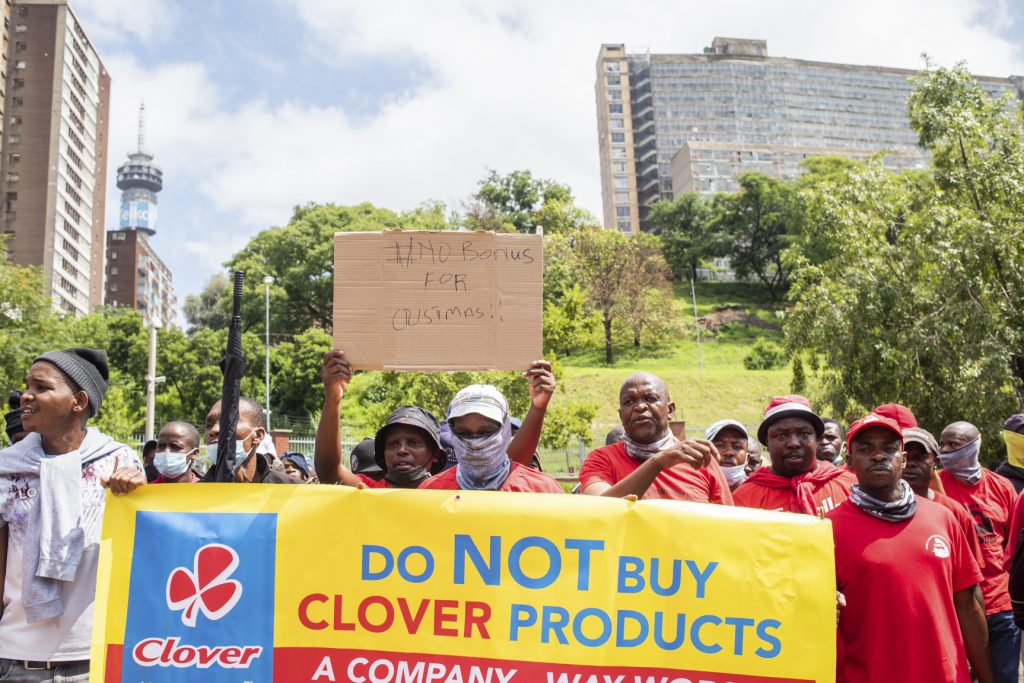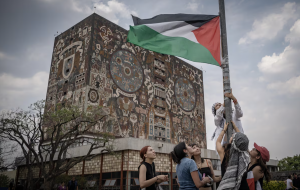Since November 22, 2021, some 5,000 workers at Clover — South Africa’s dairy giant — have been on strike to save their jobs and wages. They are represented by the General Industries Union of South Africa (GIWUSA) and the Food and Allied Workers Union (FAWU), both affiliates of the South African Federation of Trade Unions. Overwhelmingly, Clover workers are paid less than a living wage, while the company has enjoyed soaring profits for years. Wages have been cut by 20 percent in the past few months.
While 2021 profits have not yet been announced, Clover — which was established in 1898 — pulled in R10.8 billion (US$673 million) in revenues in 2020, as the pandemic raged, compared to R7.4 billion (US$462.3 million) in 2019.
As Black History Month begins today, the Clover strike is an important reminder that the struggle for Black liberation is an international one, and that it is a working-class struggle.
In 2019, Milco SA — a consortium led by Israel’s Central Bottling Company (Coca-Cola Israel) — purchased a majority stake in Clover. The purchase was approved by South African state authorities, despite widespread objections among Clover workers. At the time, both GIWUSA and FAWU warned that “the Milco acquisition could result in a jobs bloodbath at Clover.” GIWUSA said approval by the government’s Competition Commission would “have negative implications for the attempt to alleviate poverty in South Africa.”
Objections were also raised to allowing the presence of a company from Israel. During South Africa’s apartheid years, as the country increasingly became a pariah in the international community, it was Israel — another settler-colonial state with an apartheid system — that remained one of the white minority government’s closest allies. Solidarity with the Palestinian people is a hallmark of the South African working class, and opposition to the Milco purchase was an expression of that long-standing stance. In fact, since apartheid was defeated in South Africa, what has been called a “second anti-apartheid movement” has grown specifically to build solidarity with Palestinians in their ongoing struggle against Zionist occupation and repression.
The South African government’s approval of the “merger” was justified based on the argument that it would create jobs. But since its purchase, Milco has actually laid off workers, eliminating all 500 new jobs that were promised, and it has initiated a restructuring that has destroyed another 5,000 jobs. The company is seeking to lay off hundreds more workers and close several branches, which, according to the GIWUSA, would risk another 800-plus jobs.
Milco’s true aim is to convert Clover’s productive capacity in the country to a focus on exports to other parts of neocolonial Africa. As part of its restructuring, Clover is moving many facilities to coastal areas to boost this export strategy. Small towns in the country’s interior are slated for these closures, which will increase food insecurity across South Africa and wreak havoc on local economies. Already, the company has canceled contracts for milk supply from local farmers, who are in turn shutting down their farms and eliminating farmworker jobs. Milk prices are rising precipitously in many parts of South Africa just as productive and farming capacity is slashed.
At the same time, expectations are that the company will import a growing number of products from Israel.
Clover has taken to South Africa’s mainstream media to push the false claim that all this is necessary because of the pandemic.
The South African government has aided the company by refusing to defend the strike. The African National Congress (ANC) won the last elections, narrowly, on a program of job creation. It is the same government that welcomed Milco’s acquisition of Clover and now refuses to hold the company accountable for the job bloodbath. In granting its approval, the ANC government also ignored that the Central Bottling Company maintains operations throughout the occupied West Bank of Palestine — including a regional distribution center in the heart of one illegal Zionist settlement’s “industrial zone” — and in the occupied Syrian Golan Heights, in violation of international law. Instead, the government chose to advance its neoliberal policies, which privilege the interests of national and international capital at the expense of the South African masses.
Essentially, the Clover story is about South Africa’s past rearing its ugly head in the present: the exploitation of cheap Black labor to serve the interests of wealthy whites, both inside the country — the old apartheid ruling class — and beyond.
Solidarity with the Strikers — and Palestine
There has been some international solidarity with the Clover strikes, especially a day of solidarity on January 27. In New York City, Los Angeles, and San Francisco, for instance, supporters gathered at the Israeli consulate offices on that day to call attention to the strike and the workers’ demands. But it has been insufficient. Working-class struggles in Africa rarely get the same level of attention throughout the world as those on other continents.
Meanwhile, the bosses have asked South Africa’s labor court to force the strikers back to work, and to halt a growing boycott movement within the country. As All Africa has reported, “Workers have been going into stores to disrupt product sales and some supermarkets around Cape Town have not stocked Clover products for as long as eight weeks, since shortly after the strike began. According to the [union], supermarkets in cities such as Polokwane are now following suit.”
All signs point to more mass demonstrations. Most recently, GIWUSA has been pushing the boycott strategy, arguing against any court that tries to limit them. The union has reminded people that “during apartheid, boycotts in general and consumer boycotts were pivotal in industrial disputes and the battle towards the demise of apartheid.” Boycotts are being used today, the union has added, “as some of the methods to express solidarity with the Palestinian people facing brutal occupation by the Israeli state.”
The link to Palestine cannot be minimized in this struggle; it is something Clover workers and their supporters raise consistently. Even a manager from a grocery store in Cape Town said this was why he was not stocking Clover products. “My boss and some of our staff are Muslim,” he said, “and so we don’t want to be supplied by Clover because that will mean we are sending money to Israel and supporting what is happening to Palestinians there. This is our way of keeping our brothers in our prayers.”
This kind of solidarity needs to extend internationally.
Nationalize Clover under Workers’ Control!
The Clover workers are demanding that all workers be reinstated and their wages restored, and that Milco disinvest from Clover. The unions are also demanding that Clover be nationalized and transformed into a cooperative run by workers and the communities where the company has facilities. This demand predates the strike by several months.
On January 8, mass rallies were held in Johannesburg and Cape Town to demand the company’s immediate nationalization. The rallies, called by GIWUSA and FAWU, were supported by the Workers & Socialist Party, Media Review Network, Palestine Solidarity Alliance, One Voice of All Hawkers Association, and the Boycott, Divestment and Sanctions coalition.
The Clover workers need support in this fight. The exploitation of workers by Milco in South Africa — aided by the ANC government — is a form of “neo-apartheid” that must not be tolerated. The fact that it is being carried out by a company that is part of the economic backbone of the racist, colonialist state of Israel adds insult to injury for every Black worker in South Africa and for the working class around the globe.
Victory to the Clover strikers!











